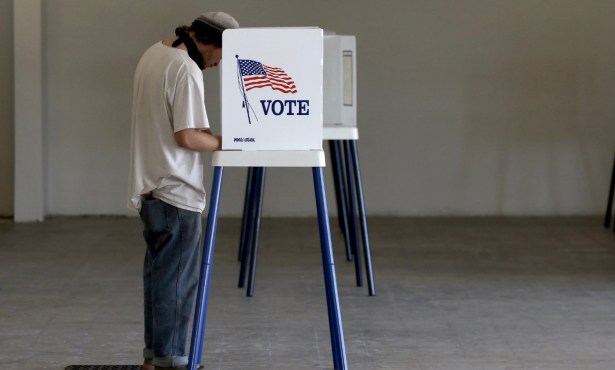Looking a Gift Dog in the Mouth
READY, FIRE, AIM: Voodoo economics is hardly new, but it used to be the exclusive domain of starry-eyed Republicans who never recovered from having read Milton Friedman in their youth. But now members from both parties are dishing out the Kool-Aid. I’m referring to the so-called economic stimulus package, in which the president and Congress have decided to jumpstart the economy by raiding $150 billion from the federal treasury and distributing $1,600 in tax rebates to every family of four, assuming, of course, the parental units are legally entwined in holy matrimony.

As empty gestures go, it’s nice enough. Who in their right mind is going to sneeze at a few hundred extra bucks? After all, you never can have enough big-screen TVs. I’ve had my eye on the Porsche designer cell phone, which lists for $1,600. Or maybe with the Burberry North South Quilted Tote Bag-which also costs $1,600-I can help the environment by not using paper bags when grocery shopping. But the idea that this might help the economy in any meaningful way is beyond silly.
It used to be economists had some pride. They hid behind thick glasses and obscure charts that no one could understand and acted as if they were smarter than everyone else. And for a while there, they had us fooled. It’s sad to see them reduced to passing out funny money and ordering us all to spend it on things no one really needs. I understand that in politics it’s more important to appear to be fixing the problem than it is to actually solve it. Even so, I was shocked to see someone as otherwise sensible as our Congressmember Lois Capps embrace this line of hooey. Et tu, Lois? If this is the best “bipartisanship” has to offer, why even bother?
The fact is that in today’s world, $150 billion still qualifies as a lot of dough. If that amount were spent in a focused, strategic fashion-as opposed to scattering it like bread crumbs on the surf-it might actually make a big difference. Maybe it could help spawn the next dot-com boom, the next biotech wave, the next Big Thing. If it were up to me, I’d put the money in the research being done to harness nanotechnology to produce smaller, lighter, more efficient batteries that run almost forever. Or the next generation of solar technology, like the tar-paper thin panels now being perfected by the likes of UCSB’s Alan Heeger. While not quite as efficient as the current design, the new product promises to be much cheaper, more flexible, and far easier to install, and can adhere (like wallpaper) to a wider array of sun-soaked surfaces. What’s not to like? Given dwindling oil supplies, it seems only prudent to begin investing in what’s coming around the corner. Admittedly, I never studied economics, but I don’t see a downside. Not only can we make a whole bunch of money, but by reducing our dependence on foreign oil supplies, we can reduce a whole lot of threats to our national security. And we can do so without bankrupting ourselves by building a bunch of new nukes.
When I read the rebate numbers promised by Congress’s cockeyed economic scheme, I am reminded of other, grimmer statistics. With the passing of each second, the United States spends $1,000 on the Iraq War and, as we quickly approach the $500 billion mark, that means every household of four is out $8,664. If the war eventually hits the $3 trillion mark, as some economists are now predicting, it will cost the average household $40,000. That’s enough to buy a couple of new cars or send some kids to college. In a lot of places, that’s a solid down payment on a new house. Certainly it’s more than designer cell phones and quilted tote bags. It’s worth remembering that when a supine Congress and the fear-fogged American public allowed George W. Bush to knowingly lead us into the wrong war at the wrong time against the wrong enemy, the cost predictions were considerably lower. In fact, when one White House adviser had the nerve to suggest the war might cost as much as $200 billion, he was fired on the spot.
Of course, all of this was avoidable. Sure, Bush and his advisers misled the American public. The Center for Public Integrity-a media watchdog group-documented how Bush and his close advisers falsely linked Saddam Hussein with Al Qaeda or weapons of mass destruction no less than 935 times during the two-year period immediately after 9/11. The same study also documented how these statements were contradicted by the best intelligence available to the White House at the time. Yes, Bush lied. But shouldn’t smart, tough, and experienced leaders, like Hillary Rodham Clinton for example, have known better? But despite all her experience-35 years worth, we are told-Clinton voted in favor of the war authorization act in October 2002. That gave Bush the blank check he needed to drag us all into his deranged fantasies about preemptive strikes and a unilateral world. Clinton has yet to disavow her vote, arguing instead that she was misled. That’s like the smokers who complain they were deceived by the tobacco executives who conspired to downplay the risks of smoking. Of course they were. But even so, they should have known better.
Going into next Tuesday’s presidential primaries, people are right to wonder about Barack Obama; there are a lot of unanswered questions. The same, unfortunately, cannot be said for Clinton. When we needed her the most, when her vote really counted, she wasn’t there. From where I sit, I don’t see much of a choice. In the meantime, I’ll seek solace in the open spaces of unanswered questions. Failing that, bring me a pitcher of Kool-Aid. Just make sure it’s loaded with lots of strychnine.



